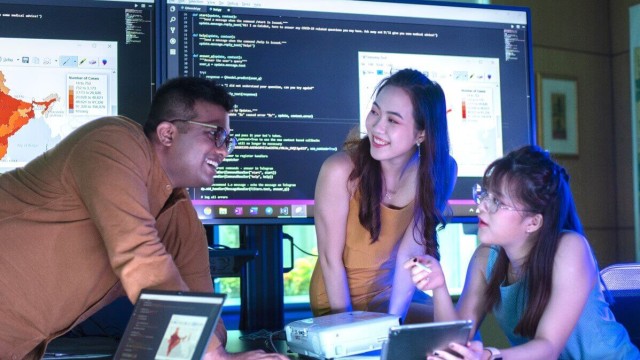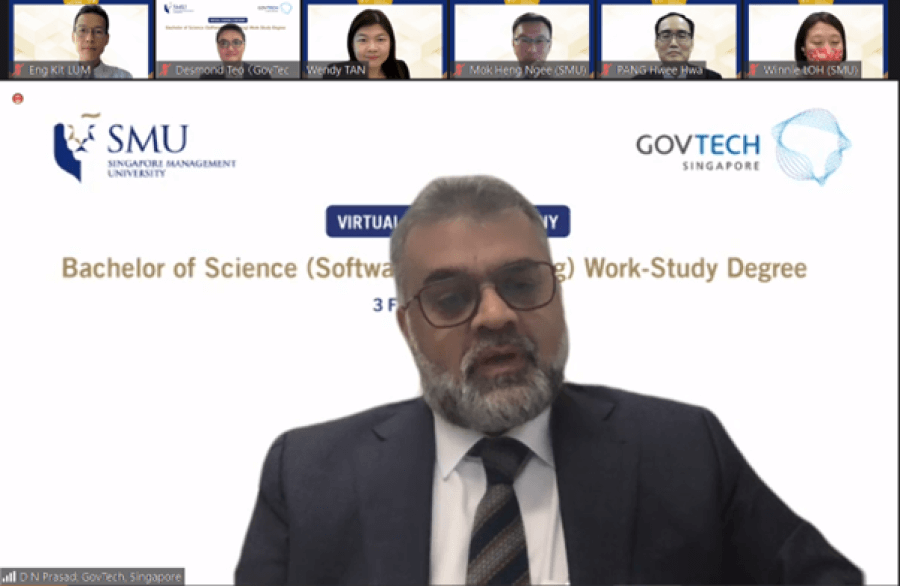
Bridging Real World and Classroom with the New SMU BSc (Software Engineering) SkillsFuture WSDegree
SMU has launched a new work-study degree in software engineering: the BSc (Software Engineering) SkillsFuture Work-Study Degree. The degree is designed to produce graduates who are equipped with technical and practical skills and knowledge needed to be successful in the industry. D N Prasad (Senior Director of Strategy, People & Organization at GovTech), Howie Lau (Managing Partner, Corporate Development and Partnerships at NCS) and SMU Professor Pang Hwee Hwa (Dean of SCIS) share what you can expect from this programme, which entails a 52-week apprenticeship and a curriculum designed by industry partners.
In today’s rapidly evolving economy, it takes more than rigorous training in coding to nurture competent software engineers. In addition to technical proficiency, practical communication skills, the ability to work constructively in a team, strong professional ethics and a can-do attitude are vital elements for success. And these are precisely the characteristics that the new Bachelor of Science (Software Engineering) SkillsFuture Work-Study Degree launched by the SMU School of Computing and Information Systems (SCIS) aims to impart. A first of its kind, the inaugural programme has been launched with GovTech and NCS as Anchor Partners.
GovTech, or the Government Technology Agency of Singapore, is a statutory board launched in 2016 to deliver the government’s digital services to the public. NCS is a leading technology services firm with presence in Asia Pacific and partners with governments and enterprises to advance communities through technology.
Inking the collaboration
On 3 February 2022, a memorandum of understanding (MOU) was signed between GovTech and SMU to formalise the BSc (Software Engineering) SkillsFuture Work-Study Degree partnership, followed by a second MOU inked with NCS on 4 July. Future software engineers will gain essential competencies through a 52-week apprenticeship and a curriculum that has been designed and taught in collaboration with anchor partners. Enabling students to work in development teams under the mentorship of practicing software engineers from the anchor partners, the programme provides in-depth and first-hand experience through impactful technology projects and products.

“We have been committed to cultivating and developing future young tech talent for Singapore,” says GovTech Senior Director of Strategy, People & Organization, D N Prasad.
“And here is where we can play a role for the ecosystem together with key partners; this is where a collaboration of such a nature is critical.”
The partnership aims to nurture a pipeline of software engineering talent through the new work-study degree, which is launching in August 2022 with its first cohort of 45 students. It strives to groom undergraduates with a strong foundation in software engineering, design principles of human programming skills, and real-world industry experience.
As NCS Managing Partner, Corporate Development and Partnerships, Howie Lau elaborates: “Our partnership with SMU on the University’s first SkillsFuture Work-Study Degree reflects our commitment to nurture tech talents and build future-ready skills, by providing software engineering talents with opportunities to be involved in exciting and impactful work at NCS.”
Responding to demand for talents
This work-study degree is the latest in a line-up of developments by SCIS. As the digitalisation of industries, economies and societies accelerated, interest from prospective computing students increased and resulted in a student intake growth over the past several years. In response, SCIS has continuously refreshed its programmes to ensure their relevance to emerging technologies and market demands, including introducing the Bachelor of Science in Computer Science in 2019 and the Bachelor of Science in Computing and Law in 2020.
“As we all know, the nature of software engineering requires technical know-how and lots of hands-on practice, teamwork and communication skills,” says Dean of SCIS, Professor Pang Hwee Hwa.
“That is what makes software engineering a very suitable subject for a work-study degree. Through a 52-week apprenticeship with our industry partners, our undergraduates will be able to hone their technical skills and soft skills by working on real-life problems in professional software development teams.”
Highlights of the BSc (Software Engineering) SkillsFuture Work-Study Degree
With a curriculum that is drawn up in consultation with practicing software engineers in Singapore, the programme will be updated regularly to keep up with market trends. A suite of 12 compulsory courses covering essential software engineering skills will precede the one-year, credit-bearing apprenticeship. Targeted at those seeking an applied IT degree, the BSc (Software Engineering) SkillsFuture Work-Study Degree offers a significantly longer apprenticeship period than typical internships.
With the opportunity to work in actual development teams, students can look forward to innovating software solutions under the mentorship of professional software engineers. Subject matter experts will also provide feedback on the curriculum, co-teach courses as adjunct faculty or guest speakers, and co-brand a Certificate of Achievement to undergraduates. This allows students to pick up industry best practices from domain specialists and gain a head-start in their careers.
Furthermore, the inaugural NCS Scholarship and Awards will be launched at SCIS. The scholarship will be awarded to outstanding third and fourth-year Work-Study students, while the awards will be presented to top students in various courses.

“The NCS Scholarship and Awards that we are launching, along with NCS’ partnership in our BSc (Software Engineering) SkillsFuture Work-Study programme, will further encourage our students to scale new heights of academic excellence, and provide them with the opportunities to experience first-hand the exciting careers at NCS and the larger IT industry,” says Prof Pang.
Aside from GovTech and NCS, SCIS is also actively seeking out other anchor partners. Besides hosting the apprenticeships, senior software engineers from these partners may also be invited to co-deliver the courses, with the programme tailored slightly to address the company’s specific needs. This move ensures that course projects can be contextualised with actual, real-life scenarios to familiarise students with domain-specific knowledge.
Bridging academia and industry
The collaboration embodies the bridging of academia and industry through technology. SMU and its anchor partners can leverage resources to co-design and co-teach the curriculum and deliver an apprenticeship programme that provides students invaluable experience in public sector digital transformation. It also aligns with a much-needed organisational “culture of learning, development and our philosophy to commit to lifetime employability and not lifetime employment”, adds Mr Prasad.
The BSc (Software Engineering) SkillsFuture Work-Study Degree is set to produce well-rounded graduates equipped with full-stack development skills and software engineering principles for designing, developing, testing, and maintaining software systems. Graduates are expected to be well-versed in cybersecurity, clean coding, DevOps and modern agile software development methodologies while gaining strong communication skills and working productively in a software development team.
As Prof Pang concludes: “I hope that this partnership will be one of many more to come and the joint effort to produce a pipeline of career-ready tech talent for Singapore and the industry.”
Aspiring to be a professional software engineer? Find out more about the BSc (Software Engineering) SkillsFuture Work-Study Degree now.



